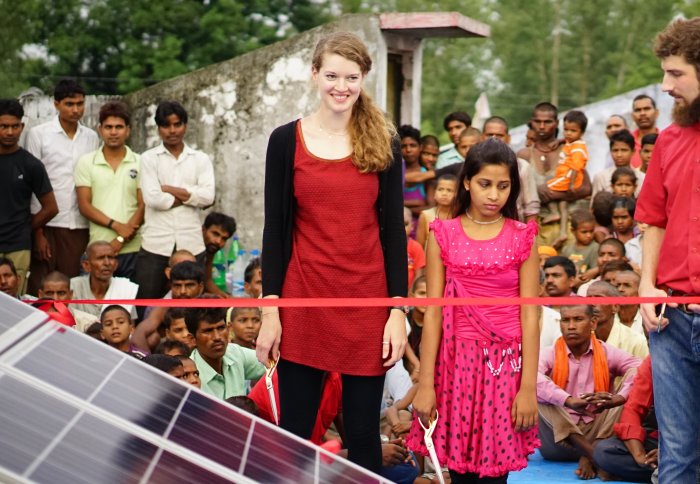Top honours for three Imperial chemists

Dr Clementine Chambon at the unveiling of a new mini solar grid in India
Three Imperial academics have won prizes in this year’s Royal Society of Chemistry Awards, including Chemistry World Entrepreneur of the Year.
The academics scooping prizes are Dr Kim Jelfs, whose work involves supramolecular materials, Dr Clementine Chambon, whose company Oorja provides cheap electricity to rural India, and Dr Artem Bakulin, who works with conductive molecules and inorganic electronic materials.
Dr Robert Parker, chief executive of the Royal Society of Chemistry (RSC) said: “The chemical sciences are vital for the wellbeing of our world and chemical scientists help to change people’s lives for the better. That’s why we’re so proud to celebrate the innovation and expertise of our community through our Prizes and Awards.
“This year’s inspiring and influential winners come from a range of specialisms, backgrounds, countries and communities. Each has done their bit to advance excellence in the chemical sciences – to improve the lives of people around the world now and in the future.”
Dr Kim Jelfs – Harrison-Meldola Memorial Prize
 The Harrison-Meldola Memorial Prizes are awarded for the most meritorious and promising original investigations in chemistry and published results of those investigations. According to the RSC, Dr Jelfs, from the Department of Chemistry, receives her prize for ‘her innovative approach to the computer-guided discovery of supramolecular and porous materials’. She receives £5000 and a medal, and will complete a UK lecture tour.
The Harrison-Meldola Memorial Prizes are awarded for the most meritorious and promising original investigations in chemistry and published results of those investigations. According to the RSC, Dr Jelfs, from the Department of Chemistry, receives her prize for ‘her innovative approach to the computer-guided discovery of supramolecular and porous materials’. She receives £5000 and a medal, and will complete a UK lecture tour.
Dr Jelfs’ work focuses on computer simulations that help predict which materials made of many molecules are the most promising to produce. These ‘supramolecular’ materials have applications in electronics, such as materials for solar cells or to generate renewable energy. They can also be used in membranes as ‘sieves’, to help separate molecules of different sizes or shapes.
She said: “I am thrilled to have been awarded a 2018 Harrison-Meldola Memorial Prize. This is recognition of the hard work that my research group have been putting in towards developing computational approaches for discovering supramolecular materials, and also to the great ongoing collaborations we have with many experimental researchers.”
Dr Clementine Chambon – Chemistry World Entrepreneur of the Year
 The Chemistry World Entrepreneur of the Year was awarded to Dr Chambon for ‘outstanding contributions to the entrepreneurial application of bioenergy to solving major environmental, social and gender challenges in rural India’.
The Chemistry World Entrepreneur of the Year was awarded to Dr Chambon for ‘outstanding contributions to the entrepreneurial application of bioenergy to solving major environmental, social and gender challenges in rural India’.
Dr Chambon, from the Department of Chemical Engineering, is the cofounder and chief technology officer of Oorja, a social enterprise that designs and installs solar and biomass mini-grids, providing affordable, reliable electricity to off-grid communities in India.
By providing a round-the-clock reliable energy supply, the company is improving the lives of India’s rural poor, enabling them to run equipment and machinery more cheaply, leading to a significant increase in their income. Their work also has an impact in other areas including economic development, food security, health, education, gender equality and climate change.
Dr Chambon said: “I am very humbled to have been selected to receive the Royal Society of Chemistry’s 2018 Chemistry World Entrepreneur of the Year Award, on behalf of my team at Oorja.
“We are grateful to the Royal Society of Chemistry for recognising our work in delivering affordable and reliable clean energy solutions to underserved communities in India. We hope to use this visibility and momentum to accelerate our impact in applying solar and bioenergy to solving major environmental, social and gender challenges in rural India.”
Dr Artem Bakulin – Marlow Award
 The Marlow Award is given in recognition of the most meritorious contributions to physical chemistry or chemical physics. Dr Bakulin, from the Department of Chemistry, receives £2000 and a medal. As part of the Award, he also receives the R.A. Robinson Lectureship Bursary, which rewards him with £3000 to lecture in either Singapore, Malaysia, Australia or New Zealand.
The Marlow Award is given in recognition of the most meritorious contributions to physical chemistry or chemical physics. Dr Bakulin, from the Department of Chemistry, receives £2000 and a medal. As part of the Award, he also receives the R.A. Robinson Lectureship Bursary, which rewards him with £3000 to lecture in either Singapore, Malaysia, Australia or New Zealand.
Dr Bakulin’s work focuses on using laser light to investigate the behaviour and functions of conductive molecules and inorganic electronic materials. These systems are already used in smartphone displays and may, in the future, find applications in low-weight and low-cost solar cells, as well as next-generation computer technologies.
He said: “I am delighted and very honoured to receive the Marlow Award from the Royal Society of Chemistry. This award acknowledges the highly interdisciplinary science we do, in close collaboration with researchers in physics, device engineering and material science.
“I want to thank all my collaborators and co-workers who made it possible and I hope that we will keep finding beautiful and practically relevant science in the fields of spectroscopy, nanotechnology and plastic electronics.”
Article text (excluding photos or graphics) © Imperial College London.
Photos and graphics subject to third party copyright used with permission or © Imperial College London.
Reporter
Hayley Dunning
Communications Division